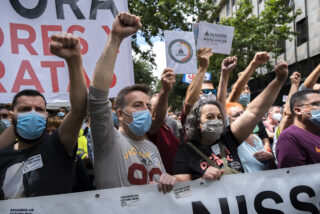4.1
4.1 There were signs the economy was becoming fairer shortly before the pandemic hit
Labour share is defined as: workers’ compensation as a share of GDP
A quarter of global emissions are now under carbon-pricing schemes, while recent research shows that some stocks are at high risk of climate-related disruption.
In many countries, stocks with the highest sensitivity to temperature earn lower returns than the others, after controlling for standard risk factors.
Reporting of sustainability metrics by global companies is still relatively low. It is particularly low in some Asian countries.
There is a massive infrastructure deficit globally, limiting the effectiveness of countries’ responses to climate change. But, infrastructure investments are crucially aligned with the transition to net-zero. China's 14th Five-Year Plan, to be agreed soon (for the years 2021-25), will be crucial to establishing a more sustainable global economy.
4.2
4.2 Climate change risk (and opportunity) is being integrated into financial services
Financial institutions are joining Science Based Targets initiatives in large numbers. The number of institutions committed to responsible investment is soaring.
The share of assets under sustainable management has grown strongly, while green bonds are becoming more popular. Green bonds were created to fund projects that have positive environmental and/or climate benefits.
The financial sector is starting to take climate-related risks and alignment with the Paris Agreement seriously. Although there is a long way to go, we believe this is a critical ingredient for tackling the climate crisis. The COVID-19 shock will only strengthen the growing emphasis on managing systemic climate risk.
It is increasingly accepted that sustainable investment helps optimise risk and return. The question now is whether this shift can be applied and adapted to all capital in the economy. We believe the EU Taxonomy will help with eradicating “greenwashing”, as will the new focus from the SEC on this topic.
Climate-focused investor groups are developing a coherent plan from the finance and investment sector in time for climate negotiations in November 2021. We believe it unlikely that the growing momentum will be derailed by the pandemic and the economic crisis.
Investors also need to demonstrate their commitment through their investment practice. At Generation, for instance, this includes: 1) assessing the implied temperature rise of our portfolios and the implications for Paris-aligned investing; 2) asking companies we invest in to set science-based targets and to double down on climate action in light of the pandemic; and 3) encouraging companies to focus on their long-term strength and resilience.
Getting sustainable investment and ESG right requires a joined-up approach with a wide set of stakeholders involved. The sector must be accountable for delivering on climate and other crucial social and environmental commitments. As part of this, we believe ESG data, a key ingredient for how the sector is developed, needs to be more forward-looking and more closely connected to companies’ real-world impact.
4.3
4.3 Economic faultlines and the need for an inclusive recovery
Low-income people are much more likely to have lost their job to the pandemic. They have seen bigger drops in their income too.
Some countries had either high public debt or high deficits leading into the crisis, so can do less to boost their economies. Economies with a high share of micro firms, such as Spain and Italy, are more exposed to COVID-19 shocks.
* As of June 4th 2020
More people are looking for jobs allowing them to work remotely, while companies which facilitate remote work have taken off.
*Zoom public release
Ability to work from home rises sharply with household income, and there are also clear gradients with respect to ethnicity. In some countries, barely anyone can work from home.
Strike action, which picked up in 2018 and 2019, looks set to continue.

Paco Freire/SOPA Images/LightRocket via Getty Images. June 2020, Nissan factory in Barcelona
Unemployment for both women and African-Americans rose more steeply in the United States during the pandemic, and is taking longer to decline.
Perceptions around the need for social safety nets and the role of the state in the economy appear to be shifting in response to COVID-19 and its impacts. It is unclear precisely how this will play out politically and in practice in the coming years. However, there is both the potential and the responsibility to make a decisive shift to a new sustainable and inclusive economic model in the months ahead.
The economic recovery plans of business and government must focus on tackling underlying sustainability challenges, as well as focusing on the opportunities. This will require a huge collective effort and will be decisive in meeting the SDGs in 2030. At present, the world is not on track to meet many of the goals.
Climate action of course requires steep emissions cuts, but it also must include addressing social issues in the transition and enhancing the resilience of vulnerable societies to climate shocks.
During the pandemic governments are running up large debts. It is crucial that the burden of paying down these debts is distributed fairly through progressive taxation. We expect this to become an important dimension of the ”just transition“ agenda. A broad societal discussion is needed around the focus of economic policy.
This crisis is a reminder of the importance of international as well as domestic institutions. We are paying the price for the erosion of such institutions since the financial crisis, and a lack of innovation to adapt them to new circumstances. New instruments are needed at the international level to help us build resilience to shocks and avoid unnecessary trade tensions.